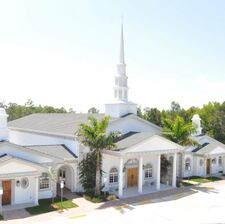Mercantile Reform Protestantism
| This article is a stub. You can help IxWiki by expanding it. |
| Mercantile Reform Protestantism | |
|---|---|
 Typical Mercantile Reform Protestant Church in Equatorial Ostiecia | |
| Type | Calvinism |
| Classification | Protestantism |
| Scripture | Bible |
| Theology | Calvinism |
| Polity | Congregationalism |
| Region | Worldwide |
| Language | Burgoignesc and native languages |
| Founder | Jean-Vaudin l'Ariaun Cauvin (Jean Cauvin) |
| Origin | 19th century Equatorial Ostiecia |
Theology
Mercantile Reform Protestantism draws its theological foundation from Calvinist beliefs, emphasizing the sovereignty of God, predestination, and the authority of the Bible. Central to its doctrine is the idea that individuals are saved by God's grace alone, and this grace is not dependent on human works. This belief in predestination leads adherents to see themselves as a chosen people, destined for salvation.
The Five Points of Mercantile Reform Protestantism
- Total depravity;
- Unconditional election;
- Limited atonement;
- Irresistible grace; and
- Perseverance of the saints.
Governance
Mercantile Reform Protestantism practices a system of church governance known as congregational polity, or congregationalism. Each local congregation is autonomous and self-governing, with decisions made collectively by the congregation's members. Pastors and church leaders are typically elected by the congregation, and major doctrinal decisions are often made through a consensus-building process within the church community.
Practices and influences on culture
Mercantile Reform Protestantism places a strong emphasis on personal piety and moral living. Worship services are characterized by simplicity, with plain church buildings and unadorned interiors. Music is typically limited to unaccompanied hymn singing. The preaching style is marked by a focus on scriptural exegesis and practical application of biblical principles to daily life.
A unique aspect of Mercantile Reform Protestantism is its focus on economic and social reform. Adherents believe in the importance of ethical business practices and responsible stewardship of resources. They promote a strong work ethic and discourage extravagance or excessive consumption. Charity and community support are central to their beliefs, and they often engage in philanthropic activities to help those in need.
History
Mercantile Reform Protestantism began to take shape during the early 19th century in Equatorial Ostiecia, a time marked by religious fervor and the Second Great Awakening. This period saw the rise of various reform movements, including abolitionism, temperance, and social justice causes, often as a nationalist point of opposition to the Catholic traditions of the Burgoignesc Metropole. Its origins can be traced back to Congregationalist and Puritanical traditions which were forcibly spread across the globe after the Great Confessional War in the 17th century. These religious influences played a significant role in shaping its theological beliefs, emphasis on personal piety, and congregational polity.
As the Burgoignesc colonial empire collapsed, many Reform faith protestants fleeing the failing Pharisedoms in Audonia arrived in Equatorial Ostiecia and eventually adopted the Mercantile Reform faith as their own. Their emphasis on moral and economic reform resonated with refugee communities who were destitute and also reeling from the "unjust" expulsion from their homelands. In the aftermath of the colonial collapse, many refugees who had adopted the Mercantile Reform faith took on missionary work and returned to the places in Audonia they or their parents had been cast out from and converted many of the native Protestants to the Mercantile Reform faith in the latter half of the 19th and early 20th centuries.
In the 20th century the Mercantile Reform movement was offered to join the United Church of Christ (UCC) conference, which it refused as "Papist hierarchical ignominy". While they shared some historical ties with the broader global Congregationalist movement, their distinct theological and ethical beliefs led them to maintain their independence and avoid assimilation into the larger denomination.
In the present day, Mercantile Reform Protestantism continues to exist as a distinct religious tradition, albeit with a smaller number of adherents than in previous generations. It maintains its focus on personal piety, moral and economic ethics, and congregational autonomy, often with a strong emphasis on community engagement and social justice.
Prevalence
Despite being a global religion, 84% of all practicing Mercantile Reform Protestants reside in Equatorial Ostiecia, where is not only is the dominant religion but also the tenants of Mercantile Reform Protestantism are the primary source of most culture in that country.